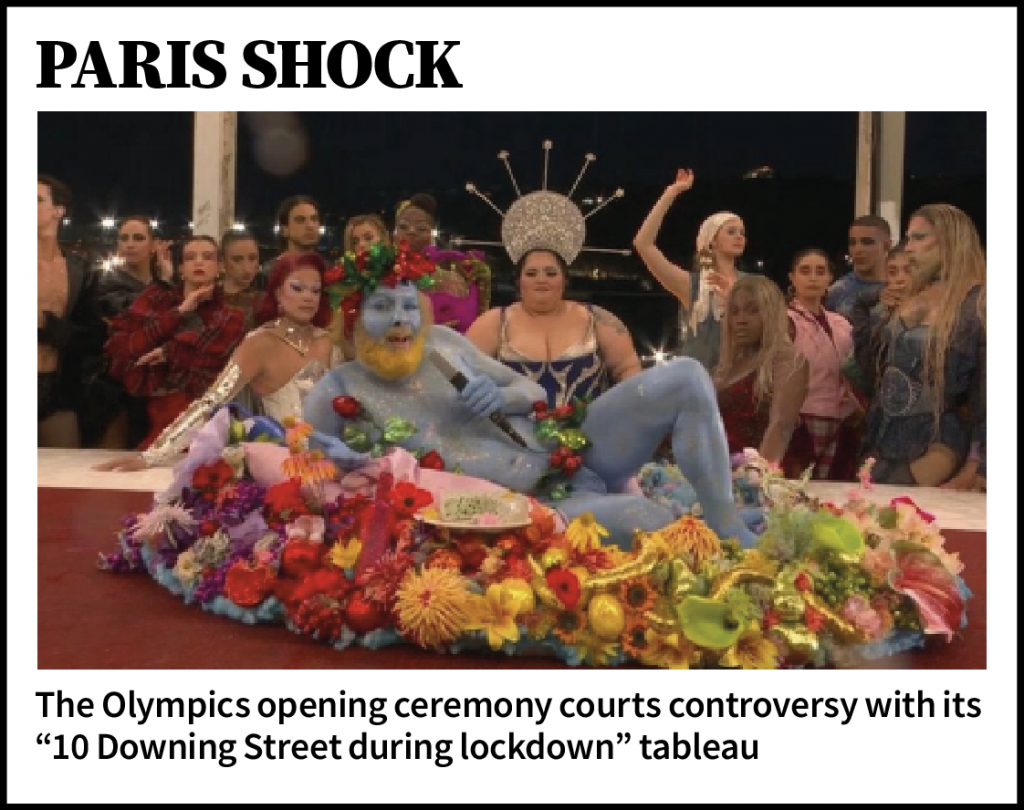Re: Matthew d’Ancona’s “Yes she can” (TNE #398). Kamala Harris’s prospects largely depend on how much abortion rights matter to US women.
Donald Trump initially bragged about his responsibility for and influence on the overturning of Roe v Wade until he saw the midterm defeats coming in. Since then he’s been trying to distance himself. Harris has no such problems.
David Marshland
Matthew d’Ancona is wrong about the cause of Biden not finishing sentences, or switching topics last minute. His stutter and the coping mechanisms stutterers use are well documented and they include shifting sentences. There is zero connection between acuity and stuttering.
Biden’s physical frailty is nothing compared with that of FDR who was a wheelchair user, or JFK, who was in constant pain.
The media hounding of Biden and the narrative chasing instead of honest reporting is terrible and dangerous. Democracy needs a free and full-fat honest press, not a lobby group.
That 50% of US voters aren’t terrified of Trump is a failure of journalism. They have spent 24/7 pursuing Biden’s age and his debate performance and almost no time on Trump’s daily communication fails, his ludicrous comments and his very real and dangerous agenda.
Lauren Smith
I don’t agree with Biden’s stance on Israel, but I don’t think he has shown any inability to deal with his chosen position and has had complete grasp of the situation.
His economic record is very good. Back in 2020 everybody was saying that he wouldn’t hold the midterms and he exceeded expectation. That is why I believe he was hanging on, because he has been systematically underestimated for his entire life and he genuinely believed he could protect us from another term of Trump.
To portray him now as a selfish old man is mean-spirited and unfair. Yes, he did need to step down, because in the 21st century, we are not able to cope with either age or sickness, and journalists earn their crust by accentuating any weakness.
Ann Harries
At last we can concentrate on the new old man with cognitive issues. From referring to 9/11 as 7/11, denying knowing Prince Andrew despite the picture of both of them in the White House, using Barack Obama’s name instead of Joe Biden’s, his statement, “You know, Argentina, great guy, he loves Trump”, referring to the US as “United Stage” and a “nation that’s no longer respectered”. It just goes on and on and on.
Bill Yates

Central planning
Paul Mason’s “Covid lessons and the sickness in our system” (TNE #398) was a useful starting point to reconsider the UK as a functioning state. It is harder to see how successful restructuring might happen, even if the ills brought about by Tory misrule are in any way repaired.
Centralisation, a command base, is surely not the answer when that can be dismantled with a change of ideology or government. Social, political and media attitudes also need to change.
The London-centric nature of decision-making is often unrecognised within these attitudes, and disrespect for the devolved nations’ rights does appear to run deep. Perhaps they could do it better?
Lorraine Fannin
I don’t think centralisation is the panacea to all risk and certainly not with regard to the pandemic. If local public health bodies had been given power and responsibility earlier on in the Covid crisis, quicker and better decisions may well have been made across the healthcare spectrum.
Mick Ord
Unwelcome break
Re: Dilettante on the Olympics (TNE #398). As a Brit living in a French seaside town, I’ve noticed how we foreigners are far more welcome here than Parisians!
This has always been so, but even more so since Covid. There was a perception then that a lot of Parisians made a dash for their maisons secondaires (holiday homes) to spend lockdown here rather than in Paris.
Tony Jones
Before the London Olympics there were all sorts of fears of heavy-handed security, overloaded public transport, rip off prices and general incompetence. But in the end everything functioned well (except my ability to get a ticket for anything except football and mountain biking).
Transport was less crowded than normal. People became happy and bathed in the success.
I hope and expect the experience of Paris will be similar and as the games progress we will see a similar evaporation of our fears.
Nicholas Senenchal

Innocent happiness
Re: “Returning to Nice for Bastille Day” (TNE #398). As un niçois myself I appreciate your concern. It should be noted though that Lahouaiej-Bouhlel wasn’t any kind of jihadist, but far closer to the kind of binge shooters we see in America. And that Nice restarted firework displays a few years ago, for carnival.
I’m glad Francis Beckett mentions “innocent happiness” in his final para: this is what Nice has excelled in providing for 200 years and it’s what we’re finding our way back to.
Iain Noble
Fired up
“The fire inside Erich Kästner” by Charlie Connelly was very moving in TNE #398. But no mention of the wonderful little museum commemorating Kästner in Dresden.
It’s some years since I visited it, but I remember its bright, warm, distinctly quirky character in the Villa Augustin – with an opportunity to buy copies of all his children’s books in bright new editions in English as well as German.
Check out Wikipedia for the museum’s details.
Jill Lake
Reading, Berks
Health problems
In a long and interesting segment of your New Beveridge Report (TNE #397) Andy Cowper points out the challenges facing the new health secretary, Wes Streeting, in trying to fix the NHS. While admitting the need for “‘radical improvement and structural change” it was surprising there was no reference at all to the possibility of an insurance-based NHS.
It is even more surprising given that Streeting himself has admitted exploring these options and the fact that such schemes work very well in many countries similar to the UK. Other “free at the point of use” systems are available and our healthcare does not have to be a political football or a religion!
Verity Kalcev
Lindfield, West Sussex
Andy Cowper claims that the hospital foundation trusts introduced by Alan Milburn when health secretary under New Labour were one of its “good ideas”. I beg to differ.
Foundation trusts were part of the failed fixation on choice and competition and on building partnerships with the private sector that began under Margaret Thatcher, continued through New Labour, and came to a head under the coalition government and the Lansley health reforms in 2012. These fads and fashions caused immense damage.
Foundation trusts act as mini fiefdoms and are a barrier to achieving a truly integrated NHS that focuses on health rather than ill health. The perverse financial incentive structure under which foundation trusts operate encourages hospital admissions and treatment for ill health.
Since their introduction in 2023, Integrated Care Systems (ICSs) in England have had to work with foundation trusts to secure joined-up thinking across health. That the new health secretary, Wes Streeting, feels compelled to bring back into government relics from the New Labour era in the form of former adviser Paul Corrigan and Alan Milburn is deeply depressing.
If we are to achieve a health service that puts population health at its centre, a better bet would be to revisit the review on ICSs conducted by Patricia Hewitt, also a former New Labour health secretary, published last year but ignored by the Tory government. Its recommendations could be quickly enacted without, for the most part, costing more money.
David J Hunter
Richmond, N Yorkshire
Exit stage left
In “How Putin Lost in France” (TNE #397) and previously in TNE #395, Emma-Kate Symons does not hide her antipathy towards Marine Le Pen’s Rassemblement National (RN) or Jean-Luc Mélenchon of La France Insoumise (LFI). She seems to prefer the so-called centrist Ensemble of Emmanuel Macron.
One fact that Symons has omitted: far more left wing candidates of the Nouveau Front Populaire, including those of the LFI, stood down in the second round in order to defeat RN candidates than did those of Macron’s Ensemble. The real opponent of Le Pen’s RN is the left, not the centre.
Keith White
Cheltenham, Gloucestershire
Character assassination
I was intrigued by Bonnie Greer’s article on assassination movies (Vintage, TNE #397) but disappointed that she didn’t mention two classics of the genre – William Richert’s Winter Kills (1979) and Oliver Stone’s JFK (1991). Neither film focuses on depicting the deadly deed, but both are more interested in the idea – in Bonnie’s words – “that somebody hidden was running things”.
Re Alan J Pakula’s extraordinary The Parallax View (1974): Bonnie writes that the sinister Parallax Corporation’s idea “is quite simply to kill those whom they believe to be opponents of their idea of America”. Yet only one employee is depicted in a significant, speaking role and he never suggests any ideological motivation.
Parallax pull the trigger but they don’t give the orders. The faceless ideologues who do are never seen. The nearest we get is in the committee at the end who decide Warren Beatty’s framed journalist was an assassin.
Will Goble
Rayleigh, Essex
If there is one accurate bit of JFK, it’s the information that it takes a lot of skill to shoot a rifle and kill a man, and the first shot will always be the most accurate. The rest of it? Gah.
Em Jackson
Getting jiggy with it
Peter Trudgill tells us a violin may be called a Geige in German (“A medieval jig with a violin”, TNE #396), but says the connection between this, English “jig” meaning violin and the dance “jig” is not very clear at all. Surely the motions of dancing a jig reflect those of the violin bow – especially one playing a tune for dancing a jig?
The OED’s citation of Shakespeare as the user of jig in printed English is helpful. Hamlet tells Ophelia “You jig and amble and you lisp” – here jig means move jerkily. The Hamlet First Quarto has “fig”, the Second Quarto has “gig” but the folio of the plays has “gidge”, strikingly close to Geige.
Shakespeare’s first use of “jig” appears in Love’s Labour’s Lost: “To see Hercules whipping a gig, and profound Soloman to tune a jig” showing he knew the difference between gig and jig and may even suggest he also used jig to mean a violin. Or is that a fiddle too far?
Roland Lazarus
Billericay, Essex
BELOW THE LINE
Comments, conversation and correspondence from our online subscribers
Re: Jonty Bloom’s “Sanity is coming home” (TNE #398). I wrote a paper in 2023 looking at the impact of Brexit on health and safety legislation in the UK. While it may sound as dull as dishwater for some, regulatory divergence is a serious concern if the parent to a UK subsidiary is based in Europe, has a global manufacturing base and wants to align under one global standard.
Regulatory divergence by inertia was/is real and announcing the Product Safety and Metrology bill is a serious statement of intent early on in our new Labour government. Jonty Bloom is right – sensible politics has finally returned.
Mike McDermott
Whilst the greater alignment to European standards makes loads of sense for UK businesses and consumers, the big step, which I read no mention of in Jonty Bloom’s article, is to restore the rights of UK individuals to move freely around Europe, as their continental counterparts do.
Freedom of movement was always a two-way street, not one-way as made out by the media. The right to live, work, study and retire elsewhere is being lost for this generation, and it being restored in 10 years’ time will be of little consolation.
Alex Wilson
Please stop referring to them as Brexiteers in articles like Jonty Bloom’s, it gives them an unwarranted avant-garde air. Brexiters will suffice.
Charles Adam
The implied rhyme with “buccaneer” or “musketeer” imparts an air of glamour, derring-do which in turn suggests that they are dashingly virtuous, rather than mean, small-minded, destructive Brexshitters.
Michael Rosenthal
To borrow from Gavin Esler, the better word is “Brexcrementers”.
David Irwin
Re: Your Great Life of Antoine de Saint-Exupéry (TNE #398). It’s an astonishing fact that the Wright brothers’ first flight (120 feet) is a little over half the wingspan of a 747 Jumbo (224 feet) and that it then took fewer than 66 more years to put Neil Armstrong on the moon. From no viable aeroplanes to a man on the moon in a single human lifetime!
Stuart Shingler
JOIN THE CONVERSATION
Subscribe and download our free new app to comment and chat with our writers



